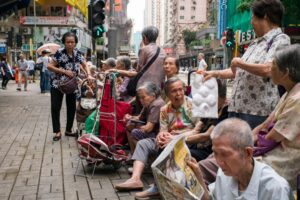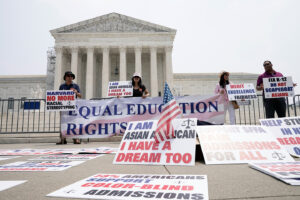Hong Kong has been a major financial hub and a highly competitive city for many years due to its strategic location, world-class infrastructure, and business-friendly policies. However, the COVID-19 pandemic has brought unprecedented challenges to the city’s economy and competitiveness. The fifth wave of COVID-19 in early 2022 has hit Hong Kong particularly hard, with strict social distancing measures and travel restrictions affecting almost every sector of the economy.
Hong Kong has been doing quite well in the recovery stage following the relaxing of social distancing measures since April last year, of which involved the scrapping of quarantine and mask mandates. We have resumed travel with the mainland and the world, watched our airport become crowded once more, and welcomed the first international cruise ship back to the city. In the business sector, the government has implemented various measures to support businesses and individuals affected by the pandemic. These include financial assistance schemes, tax relief measures, and loan guarantees for small and medium-sized enterprises. Additionally, the consumption voucher scheme has entered its third year of distribution, boosting consumption and contributing to the GDP.
However, much work remains to be done in order to regain the initial competitiveness of Hong Kong amid increasing competition from other cities in the region. This essay will discuss what Hong Kong has been doing, and should do in order to remain competitive as an International Financial Centre, as a popular tourist destination, and as Asia’s World City, focusing particularly on tourism and economic diversification.
Business Tourism
“The Hong Kong International Airport, of which we are proud, is once again packed with people.” Nearly 500,000 tourists entered Hong Kong in January – increasing approximately 7000% from last year, yet this remains to be only 7% of 2019 figures. We need to think: does the resumption of quarantine-free travel naturally ensure a large flow of tourists? Whilst this is a possibility, it is in not guaranteed.
One aspect is the attractiveness of tourist attractions, such as the Victoria Harbour waterfront, the Peak, the Avenue of Stars, theme parks and country parks. Despite being world-class attractions, they are ones that many visitors have already seen and visited. Even though Hong Kong has created new attractions, such as the Palace Museum and the M+ Museum in the West Kowloon Cultural District, it is still falling behind in terms of new attractions when compared to, for example, Singapore.
As an international Financial Center, Hong Kong could also develop its business tourism sector to make it more attractive to business travellers. The government announced that the city will be hosting events such as conferences and exhibitions to address areas ranging from finance and economics to innovation and technology, to sports, arts and culture.
However, in the new era of industry restructuring, Hong Kong must not rely on merely being “open” to attract business visitors. We must actively open up new business opportunities, for example through developing fintech and fostering innovation and entrepreneurship. While Hong Kong has a strong financial sector, it lags behind other cities in terms of innovation and technology development. To fill this gap, the government should continue to invest in R&D, promote collaboration between academia and industry, and attract more talent in science and technology fields.
Build a resilient economy
In an ever-changing world, Hong Kong faces much uncertainty and its small and highly open economy is fragile.
On the bright side, as seen from past events, Hong Kong has been quite resilient. Our free-market economy allows for flexibility and adaptability in response to changing external circumstances. The government has also implemented policies to support economic growth and stability, such as low taxes, free trade agreements, and a business-friendly regulatory environment. As a result, during the global financial crisis, our economy only contracted by 2.5%, which is lower than the global average of 4.2%. Being the gateway to mainland China and the rest of the world has further contributed to this resilience.
However, as of present Hong Kong’s economy is open to a global environment of high inflation, rising protectionism, conflicts and sanctions risk. This leaves our highly open economy fragile. We need to further improve our economy’s ability to withstand and recover quickly from sudden economic shocks so that it is able to continue to grow and thrive in adverse conditions.
A way to increase our resilience is to diversify our economy. The 2008 global financial crisis had a significant impact on Hong Kong’s economy due to its close ties with the international financial system. So whilst continuing to develop the financial system, other industries should also be enhanced. One area is technology and innovation, in which Hong Kong has already made significant progress in recent years. The Science Park in particular has become a hub for innovation with the launch of business start-ups as well as global technology institutes. More opportunities should be created to attract even more talent, with the government ideally playing a bigger role in providing the ‘hardware’ for R&D. This can be done through government funding, tax incentives, and partnerships with private companies for example. The government should also speed up the development of the Lok Ma Chau, turning it into a world-class innovation and technology centre, where top talents from the Greater Bay Area and even the rest of the world could come together to achieve their dreams, at the same time boosting the city’s global position and competitiveness.
By investing in new industries and sectors, the city could create more stable sources of income and employment while also addressing social and environmental challenges. This is grounded by focus on finance, which should still continue to be a core element in economic development.
Hong Kong is already one of the most competitive cities in the world. But improvements must be made if it wants to sustain this position in the future. In conclusion, we have looked at the impact of the expansion of tourism and diversification of the economy on reestablishing the competitiveness of the city. In order to remain competitive against cities in Asia such as Singapore and Shanghai, we need to ensure that it continues to be attractive to businesses and investors.









